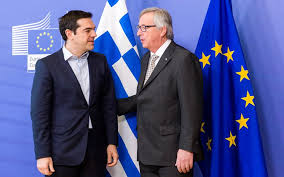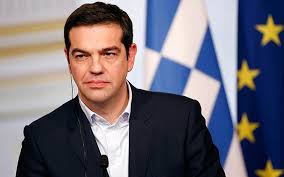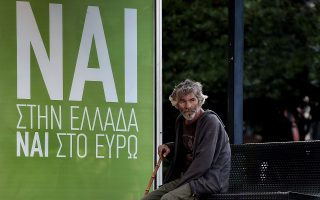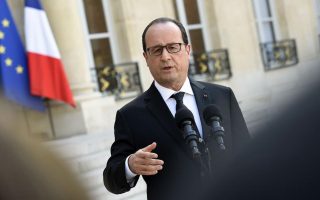After strong ‘no’ vote, Tsipras to resume talks

Greek voters delivered a resounding “no” in a referendum on Sunday that asked them to decide whether to accept a set of proposals by Greece’s creditors, leaving uncertainty ahead for Greece’s fragile economy and its fate in the eurozone.
In a televised address on Sunday night, Tsipras praised a “historic, brave choice” by Greek voters, saying “the mandate you’ve given me does not call for a break with Europe, but rather gives me greater negotiating strength.”
His comments came with around 80 percent of the vote counted, showing 60 percent of the vote saying “no” to the creditors’ proposals.
Tsipras said he was ready to return to negotiations with Greece’s creditors, indicating however that he would seek a meeting with party leaders. Later last night he visited President Prokopis Pavlopoulos and proposed the leaders’ summit.
As for the prospects for a deal, Tsipras appeared cautiously confident but said any deal should include debt relief, invoking a report by the International Monetary Fund released last week which said Greece’s debt is unsustainable without a 30 percent reduction.
“We know that there are no easy solutions but there are fair and viable solutions, as long as both sides have the will,” he said. “We showed that even under the most difficult circumstances, democracy can’t be blackmailed.”
His government’s immediate priority, he said, was to reopen Greece’s banks. It remained unclear, however, what the outlook was for Greece’s cash-strapped lenders with the European Central Bank expected to decide on Monday on whether to increase emergency liquidity to the banks.
European Commission President Jean-Claude Juncker is to hold a conference call on Monday with ECB President Mario Draghi, Eurogroup president Jeroen Dijsselbloem and European Council President Donald Tusk.
On Tuesday afternoon, Tusk said, a eurozone leaders’ summit will be held to discuss the “situation after the referendum in Greece.” Ahead of the summit, French President Francois Hollande and German Chancellor Angela Merkel are to have a working dinner to discuss Greece, Hollande said.
The EC issued a brief statement on Sunday, saying it “respects” the result of the referendum.
Other reactions were less diplomatic. “With the rejection of the rules of the eurozone… negotiations about a program worth billions are barely conceivable,” said German Economy Minister Sigmar Gabriel. “Tsipras and his government are leading the Greek people on a path of bitter abandonment and hopelessness,” Gabriel said, adding Tsipras had “torn down the last bridges on which Greece and Europe could have moved toward a compromise.”
European Parliament President Martin Schulz said Tuesday's eurozone summit should discuss a “humanitarian aid program for Greece” after Greeks rejected creditors’ proposals. He added that Greece must make “meaningful and constructive proposals” in the coming hours. “If not we are entering a very difficult and even dramatic time,” he said.
Earlier Finance Minister Yanis Varoufakis made a strong-worded statement with some conciliatory rhetoric. He said Greece’s creditors had planned to humiliate Greeks and to close the country’s banks. “Today’s ‘no’ is a big ‘yes’ to democratic Europe,” he said. “The ultimatum has been returned to those who sent it,” Varoufakis said, adding that Greece was prepared to call creditors – “one by one” – for a new round of talks. “Unfortunately over the last five months, creditors refused all substantial negotiations,” he said. “From tomorrow, with the brave ‘no’ that the Greek people gave us, we will offer a helping hand to our creditors, we will call on them one by one.” “From tomorrow, Europe, whose heart tonight beats in Greece, starts healing its wounds, our wounds,” he added.
Monday night also brought some unexpected political developments. The failure of the “yes” campaign led New Democracy leader Antonis Samaras to announce his resignation. “I understand that our great party needs a new start,” Samaras said. He urged Greeks to set aside their differences and urged the government to reach a swift deal with creditors.
The leader of centrist Potami, Stavros Theodorakis, who also campaigned strongly with the “yes” camp, called on Tsipras to reassure Greeks of his government’s commitment to Greece’s place in the euro and that people’s savings would not be “looted.” He noted that 60 percent of Greeks who voted “no” are not anti-Europe.
In a speech at Zappeio Hall, Tsipras’s coalition partner Panos Kammenos hailed “a very important day for Greece and Europe.” “It marks the end of the post-dictatorship era,” he said, pointing to the failure of the two main parties that dominated the political scene over the past 40 years, ND and PASOK. “We are not anti-European,” he declared.
The head of the Greek Communist Party (KKE), Dimitris Koutsoumbas, hailed the Greeks who, instead of voting “yes” or “no,” cast the illegal ballot that was drawn up by his party. “From the very beginning, we said that the referendum is a false dilemma,” Koutsoumbas said. “We were vindicated,” he said. He added that Greeks did not have “real alternatives that are beneficial for the people.”





